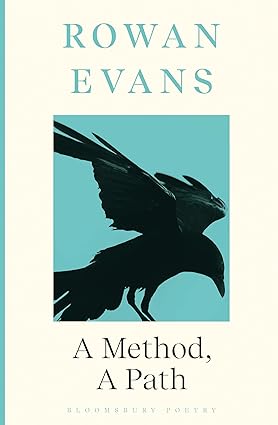A Method, A Path

The poems at the centre of A Method, A Path explore the turbulent transmission of historical and mythic voices that ‘reach across’ time and place, and a fierce rejection of the nationalist ideologies that have sought to ‘island’ them. Here, translation is a lived and open-ended negotiation, invested in the potential for magic utterance and ritual action in spite of language’s violence: ‘words / tear their wing bones / and grow new heads / in the wound (‘On Eglond’). Each poem or sequence gathers around a different instance of dialogue or communication with others: with other voices and languages, with other authors and found texts, with other species. They also mark a record of Evans’ interdisciplinary collaboration with other artists and performers through his work both as writer and sound artist.
The physical and textual landscapes of the book move from the flooded and wooded terrains of Somerset and East Anglia, to the burnt hills of Andalusía in the company of Federíco García Lorca, the poems always inhabiting a place between Evans’ own words and external voices – whether via translation, haunting, or invocation. In this ‘tirelessly inventive, substantial collection of vivid lyrical work’ (Denise Riley, Eric Gregory Awards), the truant strangeness of the more-than-human world is made present in its ability to warp and transform the poet’s voice, where ‘even the ground under your feet is a fluid, malleable surface’ (Kayo Chingonyi).
Formally inventive, rich in aslant borrowings, unafraid of visual and textual experiment, it is an exhilarating debut ― Guardian
Evans writes dispatches from a far country, where the English is Old, where the textures of life are an uncanny translation of our own political and existential divisions . Evans knows that language can soothe and inflame ― Poetry Book Society
A tour de force of strategies pushing the lyric to its extreme; here, language is wrenched and stretched at every turn, and only in considering the sequence as a whole do we begin to comprehend the complex behaviours of its character, who is likewise driven to the limits … Unnerving, disturbing and otherworldly, this is poetry of daring and, in spite of itself, sonic beauty — Judges’ Comments, Michael Marks Awards
Quietly seething ― Times Literary Supplement
In wave-gnawed whispers remnants of Gaelic, of Latin, of Old English are heard, words that survive only in manuscripts, or have shifted meaning, fallen out of use . a concern for language, for memory and for relations of person to place ― Stride Magazine
A provocative and highly erudite work that can wrench our considerations to such a degree that we feel the need to consider our own standardizations of speech and their relation to the tongue of an other ― 3:AM Magazine
An excellent collection of new poetry that is unusual, intelligent, evocative, and full of rich musicality ― Buzz Magazine